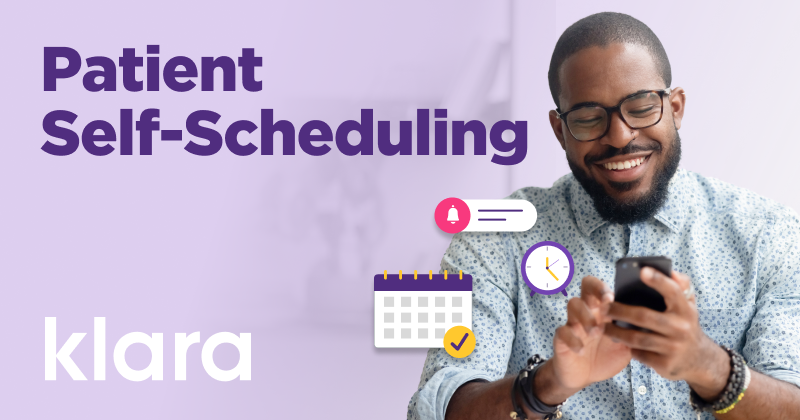Self-Scheduling Is a Must for Patient Satisfaction and Streamlined Workflows

Self-scheduling may be more convenient for patients and medical office staff
Patient self-scheduling has emerged as a crucial tool for medical practices. Its simplicity and convenience may make life easier for patients and office staff, including physicians.
Some patients, especially digital natives, may consider capabilities like self-scheduling to be table stakes: If you don’t offer it, they’ll look elsewhere for a provider.
Medical practices can benefit, too. Manual scheduling can eat up staff hours, tie up phone lines and fill inboxes. Mistakes can occur, creating bottlenecks or gaps throughout the day.
Patient self-scheduling takes some of the heat off your office staff, so they can focus on smoother operations. It may also help free up your phone lines, so patients can get through more easily if they prefer to call.
Here, we’ll run through the ways self-scheduling may help relieve stress, restore order and transform workflows as part of your digitization and engagement strategies.
Offering Patients a Digital Front Door
Over the past two decades, many industries have leveraged digital technology to provide personalized or self-managed services. Healthcare is now catching up to this shift, offering patients more robust online experiences that begin before the visit and extend throughout episodes of care.
Some providers or practice owners use the analogy of a digital front door that encourages and supports patient engagement ahead of visits. A well-executed digital front door can include self-scheduling as one of its anchor offerings.
For ModMed users, Klara’s self-scheduling is available as an add-on to your specialty-specific EHR’s Practice Management solution.
Patients can request or reschedule appointments from the Patient Portal or through two-way messaging on their phone — all without having to call your front desk. They can access real-time appointment availability for in-office or virtual appointments and can even request multiple appointments at once.
On the practice side, providers and staff can save time with automatic appointment approvals and customizable configurations by appointment type and other categories.
Self-Scheduling Benefits for Patients
Now it’s time to discover how self-scheduling can benefit your patients, helping them feel more satisfied with your medical practice.
Increased Access to Care
A recent study reveals that 61% of respondents have skipped going to the doctor because scheduling an appointment was too much of a hassle. This is a clear indication that traditional scheduling avenues fail to meet patient expectations.
You can differentiate your practice by offering self-scheduling. Giving patients more flexibility and control may make them more likely to seek and follow through on the care they need.
Less Effort and More Convenience
Self-scheduling offers patients a more convenient way to manage their healthcare needs. It eliminates the need for lengthy phone conversations and saves patients the aggravation of being put on hold or going back and forth over open time slots. Plus, patients can self-schedule appointments outside of your office’s normal business hours.
A Happier Patient Experience
The simplicity of self-scheduling contributes to a positive patient experience.
Patients who can easily book appointments online may appreciate the convenience and prefer your practice over others. Higher patient satisfaction may also help improve clinical outcomes.
Self-Scheduling Benefits for Providers
Let’s take a look at how self-scheduling can benefit providers and their staff, helping streamline otherwise labor-heavy tasks.
Efficient Use of Resources
Implementing self-scheduling can help reduce the administrative burden on medical practices. By automating appointment scheduling, providers can optimize their resources and allocate staff members to more critical tasks.
Reduced No-Shows
Since self-scheduling gives patients more control, they may be more likely to select dates and times that work for them. As a result, providers may see a reduction in rescheduling or no-shows.
With our Practice Management system, self-scheduling may be paired with automated reminders from Klara, which can help reduce the number of missed appointments.
Appointment reminders let you connect with your patients at different times through text, followed by an email or automated call if the text isn’t received. You can use our standard setup or configure messages for a more personalized feel. Messages can be customized based on provider, location and appointment type.
Patients marked in Practice Management as no-shows can also receive a text asking if they would like to reschedule. Patients can click the link in the message to select a new time.
Maximized Appointment Capacity
With self-scheduling, practices can maximize their appointment capacity. Patients have the flexibility to book appointments directly, avoiding potential delays caused by phone calls or limited availability. This may result in a higher volume of appointments.
Minimized Scheduling Errors
Manual appointment scheduling can lead to errors, such as double bookings or incorrect recording of patient information. Self-scheduling systems reduce these issues by capturing accurate data directly from patients. This helps the integrity of the scheduling process and reduces the potential for mistakes, letting the day flow more smoothly for everyone.
Stronger Patient Satisfaction
Self-scheduling demonstrates a commitment to patient-centered care. Patients may appreciate the convenience and control provided by online booking, which could positively impact their overall satisfaction. Satisfied patients may have a positive impact on your practice’s growth potential, especially if you’re set up to send patient surveys and provide opportunities to review your practice online.
By activating patients as online ambassadors for your business, you may be able to attract new patients, who can also help boost your online reputation through reviews. Most patients want their healthcare experiences to be easy — self-scheduling may be one of the reasons they recommend you.
For more on how you can implement self-scheduling at your medical practice, reach out to ModMed.
This blog is intended for informational purposes only and does not constitute legal or medical advice. Please consult with your legal counsel and other qualified advisors to ensure compliance with applicable laws, regulations and standards.


